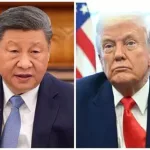Despite U.S. efforts to restrict chip sales to China, American chip giants Intel, Broadcom, Qualcomm, and Marvell Technology continue to find China a vital market, even generating more revenue there than in the U.S.
According to Chris Miller, author of “Chip War,” these restrictions were designed to allow most U.S. firms to continue selling most types of chips to Chinese customers.
Join our WhatsApp ChannelSemiconductors, used in various products like smartphones and electric vehicles, have become a global priority. China, consuming nearly half of the world’s semiconductors, presents a significant market for chipmakers. Although the U.S. export curbs focus on specific products, American companies, leveraging their technological leadership, tap into this demand.
U.S. chipmakers, including Micron Technology, AMD, and Nvidia, have adapted to serve Chinese clients despite export controls. When restrictions came into effect, Nvidia and Intel modified AI chip products for the Chinese. Even with updated export rules, Nvidia reportedly works on new chips for China, while Intel continues selling chips to Huawei.
However, AMD’s attempts faced regulatory hurdles, requiring an export license. Executives from major chip companies, part of the Semiconductor Industry Association, lobbied Washington against tighter restrictions due to the Chinese market’s importance.
READ ALSO: Lekki Port Now Strategic Hub As Nigeria-China Trade Hits $22bn
Yet, China has responded by limiting American chips in its critical infrastructure, impacting companies like Micron. Despite this, Micron plans to start production in China, recognizing its importance.
China aims for self-reliance in semiconductors, investing billions in domestic firms. Although it might catch up in certain segments, American companies like Nvidia and Intel maintain a technological lead. While China focuses on local chip procurement, analysts don’t foresee a significant shift in the supply chain.
According to Counterpoint Research, American companies lead in AI GPU technology by three to five years, though China aims to build its local supply chain for specific segments. However, challenges like higher costs persist.
In essence, while the U.S. and China navigate export restrictions and technological advancements, the semiconductor industry remains a crucial battleground defining future market dynamics.
Emmanuel Ochayi is a journalist. He is a graduate of the University of Lagos, School of first choice and the nations pride. Emmanuel is keen on exploring writing angles in different areas, including Business, climate change, politics, Education, and others.
- Emmanuel Ochayihttps://www.primebusiness.africa/author/ochayi/
- Emmanuel Ochayihttps://www.primebusiness.africa/author/ochayi/
- Emmanuel Ochayihttps://www.primebusiness.africa/author/ochayi/
- Emmanuel Ochayihttps://www.primebusiness.africa/author/ochayi/
















![Breaking: Tinubu Returns To Abuja After Europe Trip [Photos]](https://www.primebusiness.africa/wp-content/uploads/2025/04/Tinubu-returns-to-Abuja-Pohotos-2-720x480.jpeg)


Follow Us